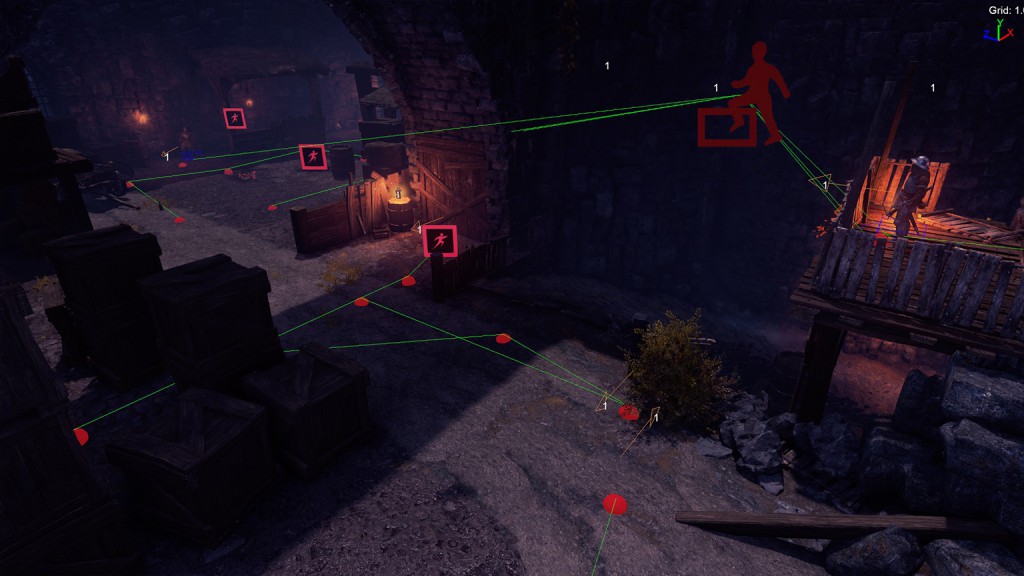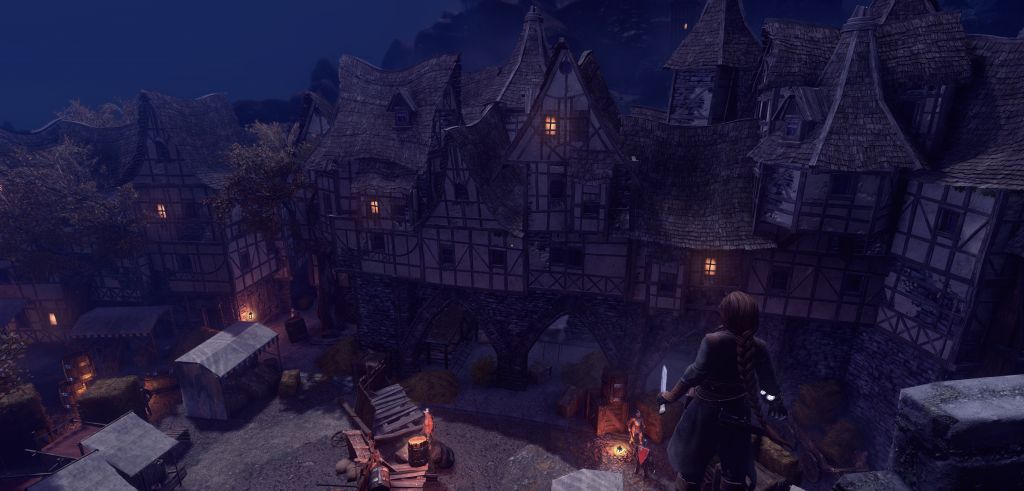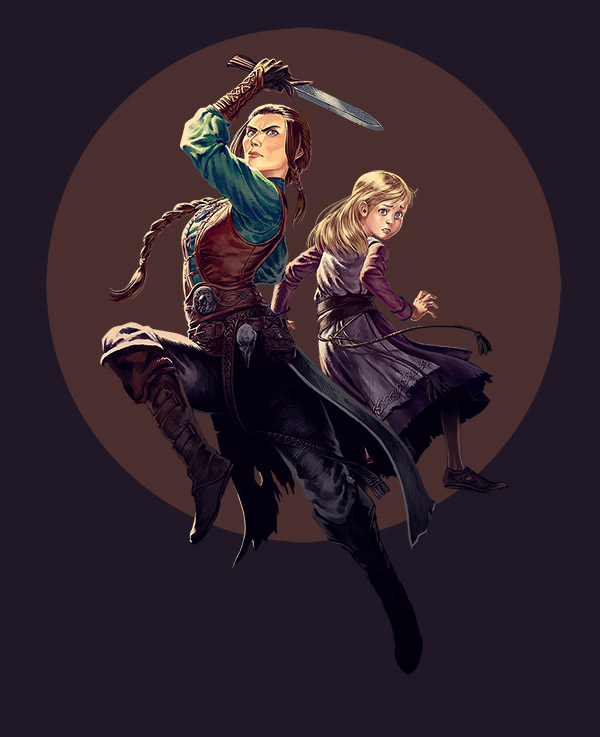Time for another Yuletide Calendar entry, and remember to comment!
This week’s theme comes with a small story: In the beginning of year 2017 we received an actual letter from one lovely fan from Russia (thanks a lot!). In the letter there were three questions on game design and how to become a designer. Four of our designers answered these questions and in this third Yuletide entry we are going to share half of these secrets with you as well. Enjoy. 😁
The pictures are from our stealth game, Shadwen!
What should I learn for now, that could be useful in game design?
Designer 1: Game design is a complex job that involves many different jobs from visual artists to programmers and producers. There are people working as game designers as well but it is rare that a person is simply just a game designer. Expert designers usually find their way to directing games by showing their skills in other fields. Such as creating fantastic looking levels in Unity, Unreal Engine or other game engine or programming their own games or even drawing beautiful concept art.
What makes a game designer then? Well, there is a simple answer: You must make games!
Everyone has their own ideas on what will be a fun game. However, what differentiates an idea guy from a designer is the ability to actually create games!
To realistically be able to create your own game, you should learn following three skills:
One. Programming. You should be able to do simple gameplay programming. I recommend learning Unity 3D which is a simple platform where you can instantenously see things work.
Two. Art. Even basic skills is enough! Draw, create 3D models or paint what you think would fit the game. That way you can recognise what kind of visual look best fits your game.
Three. Communication! This is seriously the most important skill! Find others who want to make games and combine your skills to make really cool games. This is also where art skills come in hand: if you can draw the idea on paper and show it to others, it will probably sell the game idea better than if you just tell them about it. It’s also faster than programming the entire game first.
Designer 2: Designing games is the best way to learn how to design games. It doesn’t matter if you don’t know how to actually make the games (even though a lot of free tools such as Unity are available nowadays), but writing down your own designs (to the degree of thinking through every control layout, game mechanic and so on) teaches a great deal about the design process and how to fit everything together. Your own designs also work as good portfolio material when applying for jobs. Analysing existing games and writing down how to improve them with small changes teaches to look at games critically, which is also an important skill when designing your own games.
Reading books about game design, usability and user experience can also be beneficial. For example this list has many good books that I’ve read myself, my favorites being Level Up!, The Art of Game Design and Theory Fun. The Design of Everyday Things is also a great book about usability (and usability is a important aspect of game design). Learning about psychology (to reflect on how players think) can also be useful. Google is very useful when looking for any type of learning material about game design, and a lot of it is free!

This picture visualizes AI paths, which is also a part of design.
Which errors and difficulties have you faced?
Designer 1: A very big difficulty in game design is learning to say “no”. Everyone who works in games wants to create the Most Epic Big Game every single time! However, because we work on limited time and money, sometimes you just have to say “no, that is enough, the game is now finished”. Even if the game is NOT finished…
Keep in mind that if your first game is not good or successful or not what you wanted to create at first, you can always make the next game! And the next one, and next and so on. Even if you make games just for fun this is a good process to learn.
Designer 2: During my university studies, I should have focused on making a publishable game; that is the best thing you can have in your portfolio when looking for a job, and many universities nowadays encourage students to do this (however not many seem to succeed).
Other than that, everyone makes mistakes and the most important thing is to learn from them, hopefully avoiding the same mistakes in the future. When I look at the games I’ve been involved with I see a lot of things I’d like to fix or improve now, but it doesn’t mean that the choices I made back then were not the best ones at the time, given my experience and circumstances. At least I can say I’ve learned a lot during my career so far!

A Shadwen screenshot
What type of university education must I choose?
Designer 1: There are schools, colleges or universities with game design curriculum available globally that concentrate on giving basic knowledge of all skills in games. Schools like these are great places to meet other people to work with. However, a game design school is not always the best place to learn: unless you have excellent teachers who are following the current trends of video games or have created games themselves, you might end up with less knowledge than if you had just learned it by yourself.
As for university degree, programming or computer sciences is probably the best bet. You will learn mathematics relevant to programming your own games instead of just creating ideas. If you want to create art for video games, then there are probably many college level schools with multimedia or other visual degrees available.
Designer 2: Common problem with the universities that offer video game design degrees seems to be that the teachers do not have enough professional firsthand experience about the subject they are teaching. Because of this, people in the industry have different opinions about the usefulness of such a degree. I recommend you to Google the teachers and their background before choosing your university. Do not be afraid to go and study abroad; in the scheme of things, unversity is only three to four years, a small part of your life which can give you so much in return. Programs like Erasmus organize student exchange as well, so you could choose your a local unversity that offers Erasmus exchange and visit another university for six month or even a year!
I think studying a degree in game design gives a good start and most importantly, dedicated time for the students to learn about game design – that is, if they have the motivation. If you do apply to a university with a game design degree, try your best to make a publishable game and remember that most of the learning happens independently outside of the class room.

New Shadwen art!
Any opinions about these “secrets”? Is there anything you’d like to ask from our designers or any other department? Feel free to ask us and we’ll answer the best we can, but you can also just comment the pictures. 😊
Also remember to leave a comment for a chance to win a Steam code for a game of your choice. You can choose one Steam code from the following: Shadowgrounds pack, Trine Enchanted Edition, Trine 2: Complete Edition, Trine 3: The Artifacts of Power, Shadwen or Has-Been Heroes. Instructions also here. For a higher chance to win, participate in all our social media channels. We’ll contact all winners personally!

12 comments on “Yuletide Calendar, How to Be a Game Designer 3/5”
This is a wonderfully informative post! Thank you, Frozenbyte for speaking openly about industry “secrets” (that probably shouldn’t be secrets!)
As a game development student, definitely agree with Designer #2 that there are huge differences between teachers when it comes to real world experience, and – to be honest – experience in general.
Nowadays, there is a lot of good schools dedicated to video games or programing to learn in good conditions. The time you learned in your garage is over !
There is still problems with this in many countries like Finland. Also it still stands that demonstrating your knowledge is much better than just a diploma, so garage learning can still help. 😉
Yeah wanted to point this out, but thanks for the comment!
Good points.
I can personally vouch that university degrees in particular can be a real waste of time if you are interested in game creation and might demotivate you if you get stuck in a bad one (happened to me, sadly).
I don’t think they’ve improved too much from 10-15 years ago when I tried to embark on one, although there are some more focused programs available now, but certain aspects, such as art, are practically non-existent (at least in Finland) apart from the basic “This is Photoshop, you can paint with it”-courses.
IMO The best thing out of schools is the chance to find likeminded people to work with and try to improve your skills by working on something as a team. Just bouncing off ideas and getting critique from a mate can be invaluable and keeps your motivation up.
I have been playing videogames since I was 5 years old and over the years it has emerged that the desire to make my own game and what I like to do in free time is to draw and paint. I’ve experimented with digital art, but I still have a lot of work to do to be as good as the frozen artists;
I’m studying computer engineering and who knows if one day I realize the dream of creating my own game!
(I already played a collection of trine and I loved !!: D)
Thanks for the tips on game design and Merry Christmas!
Glad to hear you liked the post. Also good luck with your game and merry christmas to you too! 😊
University lecturers in the technology subjects have a poor grasp of the real world. They’re academics and that tends to reflect poorly on the real world.
Please continue to make trine. I know trine 3 was a bit problematic but don’t be deterred. There’s still people out their rooting for you
Good point, this can especially be a problem if the teacher has only learned teaching.
Also thanks for your support! Trine is still close to our hearts so hopefully we can get back to it. 😊
Well I’m not into game design but that was pretty interesting 🙂 Thank you.
And yeah we need another trine please, the first and second (included goblin menace) are part of my favourites games.
Interesting.
Thanks for this post! Its really inspiring for me, I worked as a game designer (or something like that 😛 ) for almost two years, and I will like to follow that path. Recently I started designing my own game and posts like this really makes me wanna see it published.
I’d like to encourage you was well. 😊
Also thanks for the message and good luck with the project!
Leave a Reply